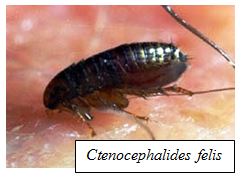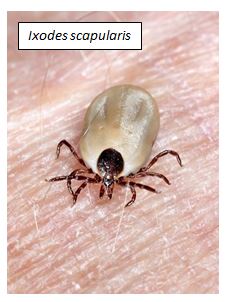Fleas

The most common species affecting domestic animals, both cats and dogs, is the cat flea, Ctenocephalides felis (cat flea). Other species known to affect domestic animals are Ctenocephalides canis (dog flea), Echidnophaga gallinacean (poultry sticktight flea) and Pulex irritans (human flea). Fleas can be found outside in the environment or hitching a ride from other animals around you. They have a darkly colored, hard body that is laterally flattened (squished from side to side). This body shape helps the flea to move between the hairs or feather on its host's body. They can also be vectors for more serious diseases and parasites including tapeworms and heartworm disease, and the bacteria that cause typhus and bubonic plague.

Tapeworms

The two most common types of tapeworm are Dipylidium caninum (the double-pored or cucumber seed dog tapeworm) and Taenia pisiformis (dog tapeworm). This parasitic worm lives in the intestines of its host, absorbing the animal's nutrients and growing up to 20 inches long! Worried about tapeworm? Keep a lookout for rice-like worms in your pet’s stool. Other intestinal parasites that affect domestic animals include hookworm and roundworm.
Ticks

Ticks are crafty little critters that sit on the ends of long grass and wait
to jump onto their hosts. In Ontario, we see Ixodes scapularis (deer
ticks) and Rhipicephales sanguineus
(brown dog ticks). Ticks can carry one or more diseases such as Lyme disease, Ehrlichiosis, Anaplasmosis, Rocky Mountain
spotted fever, Hepatozoonosis and Babesiosis. Often many pet owners don’t know their animal is
suffering from a debilitating tick disease until it’s too late. Symptoms can be
vague and difficult to recognize. Want to know more about ticks? Visit this
website for more information:
http://www.health.gov.on.ca/en/public/publications/disease/lyme.aspx
Mites

Cheyletiella spp. (walking dandruff mites), Demodex canis (follicle mites or red mange mites), Notoedres cati (cat mange mites), Otodectes cynotis (ear mites) and Sarcoptes scabiei (mange mites) can be found in the environment, in kennels and on other animals in our area. Mites can cause skin lesions and debris that often need treatment with antiseborrheic shampoo. Watch this video to see what they look like under a microscope!
Heartworm Disease

A potentially fatal disease, heartworm disease (dirofilariasis) is transmitted by mosquitoes and is on the rise in Ontario. This disease is detected via blood test and can be prevented through different methods. Adult heartworms live in the heart of infected dogs. One dog can have as many as 300 worms and can grow up to 14 inches long! To find out more, visit this website:
http://www.ovma.org/pet_owners/dogs/heartworm.html
Check out this interactive map to see if heartworm disease and Lyme disease is in your area.
http://www.dogsandticks.com/diseases_in_your_area.php
Prevention and Treatment
Talk to your veterinarian about different types of products to treat and protect your loved ones from parasites and diseases. Some of these prevention products include chewable tablets, topical parasiticides and injections. Dewormers found in clinics come in tablet form, suspension, chewable tablets and topical parasiticides.
Image References:
http://www.scottcamazine.com/photos/Vectors/source/image/ixodes_scapularis_4.jpg
http://www.denniskunkel.com/gallery/misc_invertebrates/23608B.jpg
http://www.lastrefuge.co.uk/images-database/david-spears/big1/cat-flea.jpg
http://www.ext.colostate.edu/pubs/insect/insimg/05600F02.jpg
http://vetbook.org/wiki/rabbit/images/thumb/6/66/Cheyletiella01.jpg/180px-Cheyletiella01.jpg
http://mcgilvrayvet.com/clients/6327/images/heartworm_heart.jpg
